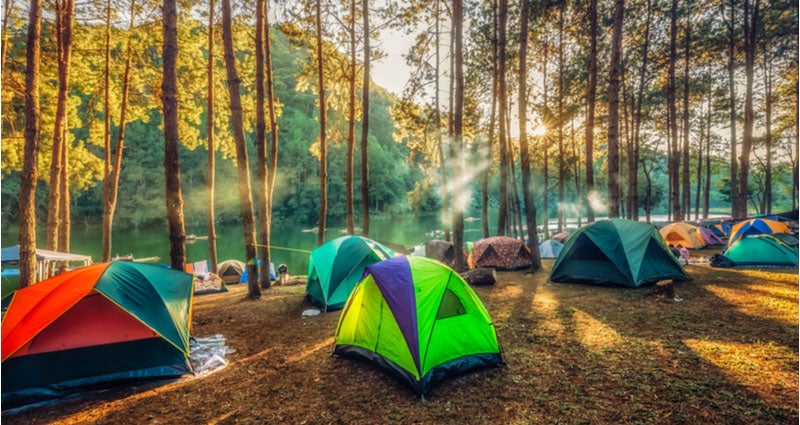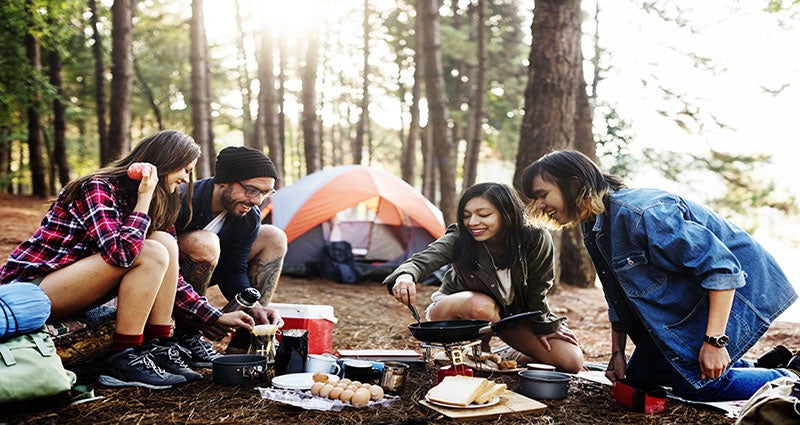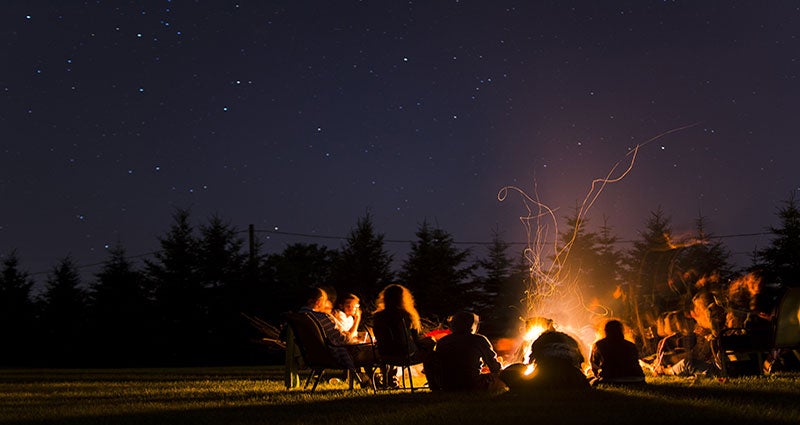9 Camping Tips for Beginners

If you’ve never been camping before, it can be daunting starting to prepare for your first ever camping trip. There are so many things you need to plan ahead and it can be overwhelming. That’s why we put this short guide together to help you make the best of your first camping experience.
1. Choosing your camping site
It can be overwhelming choosing your first ever camping destination with thousands of options out there. Research your destination so you can give yourself the best chance of having a good time.
A great starting point is the actual geographical location of the site. Go somewhere near your home town for your first camping experience so that you can quickly nip back if you’ve forgotten something or you suddenly decide that camping isn’t for you. You’ll also know all the shops and restaurants in the area should you need them.
Another important criteria is the on-site facilities. Check things like toilets and shower facilities and where they are located relative to the pitches. If you have children or a dog, enquire whether the site is child-friendly and welcomes pets.
2. Choosing a tent
Tents come in lots of different shapes, sizes and can have lots of additional features, so it’s normal to be confused if you’ve never been tent shopping before. It’s one of the most important parts of your camping trip and your equipment, so it’s crucial to make time and do some research into the different types on the market and choose the right one for you.
You’ll notice that the size of the tent is measured in berths, that is how many people can sleep in it. When deciding, take into consideration not only how many people will be using it, but how much equipment you’ll be storing inside it as well. It’s a good idea to buy a tent that is 1-2 sizes bigger than the number of guests. Go to an outdoor specialist shop and see the tent you want to buy in person as tents of the same berth can be of different sizes.
Check with your campsite if there are any restrictions on tent size or if they charge for two pitches for large tents.
Before you set off on your camping break, pack the tent last so it’s the first thing out of the car and you can pitch it right away.
3. Sleeping bags
Sleeping bags are an essential piece of camping gear all year round and can make or break a good night’s sleep. Your outdoor adventure won’t be very enjoyable if you wake up more tired than you were when you went to bed. That’s why choosing a sleeping bag is one of the most important decisions for first-time campers.
Opt for a comfortable one, that’s the right size for you. If it’s too big, it won’t keep you warm enough as there will be too much air inside it to warm up. If it’s too small, you’ll overheat and won’t have enough room to move around in it. Make sure it is thick enough and provides enough insulation.
Sleeping bags can seem expensive when you’ve never used them before, but it’s one piece of gear you will want to splurge on. It will be worth it!
4. Cooking
Save time and effort by planning your meals ahead. Decide what you’re going to have for each meal every day and make a shopping list for all the ingredients you’re going to need and where you’ll get them from.

You won’t be able to prepare complex recipes, but that doesn’t mean you can’t have some tasty meals. Check out our quick and easy family meals blog for some inspiration.
Equipment-wise there are plenty you can choose from depending on your skills and storage space - barbecue, camping stove or backpacking stove. Check with your camping site if campfires are allowed if you’re planning on cooking on an open fire.
Even if you’re an excellent cook in the kitchen at home, things can go wrong when preparing food in the middle of the great outdoors, so make sure you have a plan B. This can either be some ready meals or a list of pubs, restaurants and supermarkets nearby.
5. Test your equipment
It would be a shame to go all the way to a camping site and get ready to set up your tent, only to realise that you don’t know how to do it or it’s faulty. Give yourself peace of mind by testing your equipment and practising pitching your tent in your garden or a friends’ garden. A trial run will help you ease into it and save you time and trouble on the real trip.
Learn how to put the tent up and how to take it down and take pictures of the different stages if you find it complicated. It’s better to discover any potential issues at home, especially with new equipment, so you can fix it or replace it in time for your trip.
Since the tent is up, why not have a practice camp night? This way you’ll get used to the outdoors, test the rest of your gear such as the stove and determine how many layers you need to wear.
6. Staying warm
You might think staying warm is only an issue in the winter, however, summer days can be quite chilly and wet in the UK. Check the weather forecast beforehand and pack the right kind of gear.
You’ll find a waterproof jacket, trousers and boots useful throughout the year. Bring several layers such as thermals and insulating clothes so you can always take them off or put more on as needed. If your clothes get damp or dirty, it’s better to take them off because they won’t be as insulating anymore.
At night, get into the tent and zip it up half an hour before you go to bed so the heat can accumulate for when you’re ready to go to sleep. Another useful tip is to put your clothes for the next day into your sleeping bag so they are warm in the morning.
7. Make a checklist
Probably the first thing on your list should be … to make a list. Before you even start buying any equipment, spend some time planning your trip and making a checklist of everything you need to do and everything you need to take with you. As you’ve never done this before, it can be easy to forget something.
8. Campfire
Making a bonfire is one of the most entertaining and even the highlight of a camping trip. First of all, check with your campsite whether they allow open fires.

Using the right kind of wood is vital for a roaring campfire. Use the driest wood you can find on the ground (don’t damage trees or bushes) or bring your own. Make sure to have three types of wood:
-
small pieces (dry bark, small twigs) – they will act as tinder
-
larger twigs
-
logs that will burn for a long time.
It’s very important that you make your fire away from any tents and other camping equipment to reduce the risk of them catching fire. Keep a bucket of water and a fire extinguisher close by just in case. Never leave it unattended and make sure it’s properly extinguished when you have finished using it.
Other essential camping gear
Besides the obvious equipment such as a tent and sleeping bags, there are other things that you should pack for your time away from home. For example:
-
sleeping pads
-
pillows
-
torches
-
picnic table and chairs
-
blankets
-
first aid kit
Have a look at our complete camping checklist for some inspiration. Select the ones that suit your needs and add more as you see fit.
Beginners can borrow some equipment from friends and family until they decide whether they enjoy camping and want to experience it again. If they do, they’ll build their equipment over time.
No matter where and when you go camping, if it’s your first time sleeping under the canvas, these tips should help you enjoy your camping trip to the fullest.
Our water parks not only bring vital water resources for the region, but they also provide a fantastic day out for all the family.
Whether you're looking for an action-packed day on the water, a spot of fishing to escape the stresses and strains of everyday life, or simply want to enjoy a relaxing walk in beautiful surroundings, look no further than our fabulous water parks.
